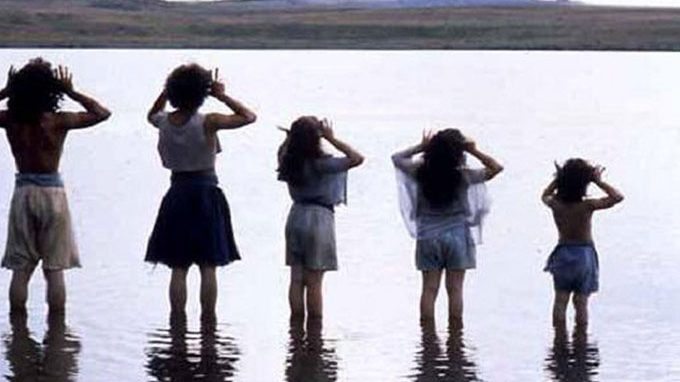Painting an untold story of an extraterrestrial’s adventure on Earth, “La Belle Verte” (The Green Beautiful) is a film that encouraged viewers to question the conventions of human society on our planet, by looking from the eyes of beings from another planet. It was written and directed by Coline Serreau (Three Men and a Cradle), who also starred in this 1996 movie with French actor Vincent Lindon.
The story begins with a large crowd of people who are delegates from their villages. As we soon find out, they live on a very civilized and prosperous planet away from Earth. These elevated beings often gather on the summit of a mountain in an open, green field for meetings focused on improving their society. Telepathic and egalitarian, they produce goods of their specialty and trade with others according to their specific needs rather than using monetary systems. They communicate by telepathy and thrive in bliss and unity. In this carefree society, people are bestowed with longevity and typically live until the age of 250 years. Because of their benevolent and adventurous nature, there are many volunteers who are eager to travel to other planets in order to teach and learn from their inhabitants. However, no one wants to visit Earth.
After a long discussion, the main character Mila, played by the director Coline Serreau, is the sole volunteer for a mission to Earth. Her fellow citizens help Mila with all preparations, giving her useful tips, including the skill to “disconnect” a person. This transforms the individual to become more open and considerate of his or her surroundings.
Upon arrival, Mila has a difficult time adjusting to her new location. She does not like the lack of biodiversity. In addition, she observes that people are not very happy. She saw an exhibition of “dead bodies,” which is actually the meat at a shop, and notices that the food is making all Earthlings sick.
Unable to consume Earth’s food, she telepathically communicates with her planet by placing her feet in water and learns that she must hold a baby in order to recharge her energy. She goes into a hospital where she finds a sick infant to energize her while she heals him. Macha, a nice young lady who cares for the newborns, reveals to Mila that the baby does not have a family and may be taken by the welfare services.
After meeting the stern head of the medical center, Professor Max Varron, Mila “disconnects” him, and he decides to help Mila in her mission. Together, they must rescue the infant and help people awaken to the inherent beauties of their world.
By depicting the stark contrasts between Mila’s innocent and concerned thoughts and the behavior of the people she meets, the film “The Green Beautiful” portrays the potential of life on Earth with the restoration of compassion and eco-consciousness. Like the elevated beings elsewhere, humans can also create an atmosphere of peace and hospitality.
Supreme Master Television had the pleasant honor to speak to this filmmaker.
INTERVIEWER: There is another very good movie entitled “The Green Beautiful” that you made, more than 15 years ago. We have to say that you have been and still are a great pioneer in many things. You have a vision of our society – people talk about it today – but 15 years ago you were the only one to talk about it and point out what was wrong and what was absurd.
COLINE SERREAU: It is true that during that time, I was not sure of myself – because I am always in doubt and when we create we question everything all the time, every day. I was in a state of profound conviction that what I was doing was right; that I was saying the right thing. It really was a very profound conviction because it takes three years of one’s lifetime to make a movie. It is physically very, very difficult. If you really don’t have this intimate and profound conviction that it is worth it, frankly it is not worth doing it. And so, I had this conviction; and when the movie was released, people did not see what was in it… And so, it was very difficult for me at that time. But eventually it caught up. I mean, now people probably talk about that movie more than any other movie. He was a bit premature but now it is developing well.
INTERVIEWER: Already, 15 years ago, you said you were coming from another planet, more evolved. And you say, “How is it possible? How come they still use money and are carnivores and personal interests come first…?
COLINE SERREAU: Yes. As they say, we need money. We even need money for food. We have to eat. So we shouldn’t buy food. What is that? In fact this seems obvious. We shouldn’t buy food; eating is a right. Clean air, clean water; this is a right; it is a right that was taken away from us. The land is free as well. What I mean is that the earth gives freely.
I will take one of the best examples: seeds – besides, the whole ancient farming, which is perennial, productive, and which nourishes and cures us, is free. That is, there is nothing to buy. Everything here circulates and nourishes us. And so, we become once again as noble as the animals and plants that do not need to buy their food. A seed would give us thousands of other seeds.
And now they created a system where one seed gives us nothing. And that is what we are forced to eat, and what makes us sick. And on top of that, it limits the completely natural generosity of the earth. How did Noah manage? He planted a grain of wheat. And then he had ten, a hundred, a thousand and it spread. That is how we have survived.
One of the most talented French filmmakers of the present, Ms. Coline Serreau, has always been inclined to address social issues in her successful and engaging works. Her famous 1985 comedy film, Three Men and a Cradle, won three prestigious César Awards, including one for Best Writing. It shed a hilarious yet heartwarming light on fatherhood.
According to Ms. Serreau, art should serve the purpose of improving people’s lives.
INTERVIEWER: I was very touched by your movie “Saint Jack, Mecca.” You really have a benevolent look on people; and you often show their evolution, their transformation toward the good. And that’s exactly one of those examples. And why did you choose this title?
COLINE SERREAU: Because these are big pilgrimages and it is also a way to say: We have different opinions, different climates, different varieties of plants and animals on this planet and it’s true that it is good that we are very different from one another. But in the end, the profound aspirations are the same; for humans in any case. And even, I would nearly say, also for plants and animals.
So the idea to leave the house, to walk, to make a journey to try to understand something of life, that has always existed in every civilization, in all cultures. The great myths and the great events that punctuate a life, have always been the same in all the big religions. There is the pilgrimage, there is the fast in all religions. There are the great rites of passage. And it was a way to say, let’s stop fighting with each other. Because we have in fact the same rites.
Ms. Serreau also shared the themes behind Chaos, a 2001 film depicting the transformation of a wealthy French housewife who risks her comfortable life to help a young woman escape and recover from an abusive situation.
INTERVIEWER: We have to mention to the viewers that there is also great humor in your movies; that one laughs a happy laugh, a laugh that is full of love. There is a way to look at people with love. There is also another film, “Chaos.” This one is a little different. And this heroine… she transforms herself. She still stands up and changes completely…
COLINE SERREAU: Yes. “Chaos” really is a triple transformation. I think that everyone has something very good in them, but it has been destroyed or altered, one way or the other. And what I find interesting is precisely when things revolutionize and change. So, he changes, his wife also changes. As she becomes aware that she must look after this girl, she is also aware that she can’t just be oblivious to anything else. I think there are moments of awakening; something that resonated in her and made her understand that in doing that, she is also helping herself. And so, she focuses on her own life, her relationship with her son, her husband that she loves. And obviously, the girl who has been very harsh, very tough after what she has been through, is also changing.
In April 2010, Ms. Serreau’s most recent film was released: Local Solutions for a Global Disorder. It took her deepest concerns, shared by a growing number of people worldwide, regarding the problems of modern-day food production as well as the solutions.
COLINE SERREAU: We are not in an infinite world, we are in a finite world. But we are constructing an agriculture in an infinite way. “Let’s go!” The petroleum will soon be exhausted. And the soil, well that’s really finished. The soils are dead. We live in virtual deserts. The minute you remove the petroleum, you remove the fertilizers, the pesticides and everything which feeds the tractors and the tractors, there are no more soils, there is nothing anymore; it’s like plastic. It’s exactly like that floor there. It will give nothing; it will give nothing anymore.
Local Solutions for a Global Disorder was premiered in Belgium at the European Parliament. Parliament Member Her Excellency Michèle Rivasi from France commented, “I wanted to broadcast the film in the presence of Coline Serreau at the European Parliament because it just brings concrete solutions replicable throughout the world.” According to Ms. Serreau, the time had come for a film that not only spelled the frightening warnings, but also offered alternatives through the voices of the best experts – small crop farmers, philosophers, and economists.
COLINE SERREAU: And we know now that there are about – in France alone – there are more than 8 million people who have different practices, who do things differently, who reflect, who experiment and all that. So in fact, this new society is not a majority, but she is bristling with life to soon become the only society which can continue to give us an existence. There. So that was what I wanted to show, that this new society, this society we are awaiting, we are hoping for, is in the making. It is being made by people who don’t have a voice. Or the small people – because the farmers rarely have a voice.
To make the film, Ms. Serreau traveled around the world for three years, speaking with some of the most knowledgeable about sustainable community initiatives across various countries.
COLINE SERREAU: And deep down, I see the reactions of the public – of course they learn many things with great specialists. But what really touches them, is to see the small lady in Ukraine who shows us how beautiful the seeds are which she selected herself, and the hybrid seeds are less good. Or how Narayan Reidi, the small Indian farmer, can, on 1.8 hectares, feed 15 people, totally self-sufficient, and sell tons of fruit, tons of spices, tons of cereals. He is incredibly rich. India is an extremely rich country. Even those who are urban, they have grandparents who were inevitably farmers. So everyone knows somehow unconsciously that it’s there where we are fed, by the earth.
Today, industrialized conventional methods are silently wreaking havoc in the ecosphere.
COLINE SERREAU: And on the earth, what is there? Millions and billions of animals, and germs, and fungus that are crawling in there; the earth is them. The earth is a fauna. While a part is in charge of nourishing the plants and airing the sun, another part is in charge of, in greater depth, bringing up the minerals in the rocks; that is the role they play. And all that is destroyed by bringing an industrial system of monoculture.
You are destroying this, because at that moment, what you produce is no longer considered as something which has to circulate and feed the people. It is considered as a merchandise. From the moment that it is considered as a merchandise, it always needs to be sold more expensive. And then you start to exhaust the earth, because you put extra chemical fertilizers.
You’re adding things which kill life in the earth. You will get a very big production which will little by little be exhausted as it is happening at the moment.
INTERVIEWER: How do you see the place of the livestock animal? It is not in your movie, which you made a very long time ago, 15 years ago, “The Beautiful Green.” And you were the principal heroine. You came from another planet. And there on Earth you are also shocked to see (COLINE SERREAU: “They eat cadavers!”) carnivorous people there.
COLINE SERREAU: That is also the same problem in fact. The plant proteins, you see, there are lots of them. First it’s very bad for our health to eat too much meat, it is the highway to cancer. And then also, we really are very numerous nowadays on this planet. We can feed all the people who are there perfectly well. But we cannot feed them if we keep giving them meat all the time. Because meat equals 20 vegetarian meals… A steak equals 20 meals of grain. And this food, those 20 meals, which are soya meal, all those things which we feed to animals to be able to eat animals. They themselves consume a huge amount of water. So, there are millions of liters of water that disappear and dry up the planet for soya meal. We have convinced people that they need a lot of meat to earn more money with the meat. But this doesn’t correspond to a human need. It corresponds to a kind of accumulation. So it destroys the cows – the cows become very ill, it has already been proven, the mad cow disease, all the diseases which come with it. It makes everybody ill.
INTERVIEWER: And you are saying that one of the solutions is organic farming.
COLINE SERREAU: Yes. Organic and local. That is what we stand for. Because it can be organic and still come from Romania or even Morocco; meanwhile, people go hungry over there, while good organic food is made for rich people. This is not good either; it is not like that. We have to produce organic food locally and live on food that is growing in our country, on our land, as they grow. The intensive agriculture is so-called “feeding the entire world.” It has well proven that it cannot. Organic agriculture on the contrary, the Food and Agriculture Organization (FAO) has said in its last report that organic agriculture can feed the planet without any problem. So well, if they don’t take stock of this incredible injustice and this chaos, they will be swept away. Because it has always ended up like that in history. At a certain moment, people want to live and then that’s it. And they can become violent!
COLINE SERREAU: There is nobody who feels like taking up the weapons. People want to live happily in peace; to raise their kids, to live and to live good.
INTERVIEWER: We could say that your movie entitled “Local Solution for a Global Disorder” in reality – if these solutions are applied – could engender a big revolution?
COLINE SERREAU: Yes, it is the big revolution. The word revolution is when it’s turning. So there are several meanings for this word. The revolution is surely necessary insofar as the system… that there is a rotation of values and that the system changes; because revolution means evolving. It will have to evolve at least.
INTERVIEWER: If you would have a magic stick for instance, as a filmmaker, in theory you could have one; what would be the world in which you would like to live? How do you see this world? Do you think it can be realized?
COLINE SERREAU: But I like this world, if not I wouldn’t want to change it. If not, it would not last. On the contrary, 99% of the people are superb. So I’m not looking for another world. It is this world that needs to be transformed. I am a very modest filmmaker; in other words, I am a reflection of the society in which I live. It’s others who give me food. And it’s the others who give me intellectual food as well; through my observation of the world. That’s my role. I am not a politician, and I’m not at all somebody who tells people, “Do this, do that!” But it’s true that a world where we already could eat correctly and have peace in our head by telling ourselves, “My children eat well; they eat things which don’t poison them and which will not make them ill,” that would already be an enormous progress. And also that we wouldn’t be in a system of oppression and dependence anymore. In other words, that we are in an autonomous system, where everyone decides what he would like to do. In mutual aid and collective systems… People are never happy to be assisted. People, humans are made to work. They want to work, to make useful things for themselves and for others. At the end of the day, that’s the “why are we on Earth?” It is also to make good things.
INTERVIEWER: And I still wanted to ask you – having seen your remarkable movies, and which I really encourage everyone to see – where does your optimism come from?
COLINE SERREAU: Yes. Because humor helps. And I am optimistic because why should we be pessimistic? We can be conscious but pessimistic… I do not know! Because I like this world still.
INTERVIEWER: Yes. And you believe in human beings?
COLINE SERREAU: Yes of course, I believe in the human being. Otherwise I wouldn’t have had children. And as mothers, we are inevitably even more sensitive because as we bring children into the world, we want them to live. We gave birth to them, we brought them up and we pushed them into this world. And we did not do this so that they would find themselves in a world which is only bad. In fact, we can change things. Always.
INTERVIEWER: Thanks to you and congratulations for your wonderful work.
COLINE SERREAU: Thank you.
INTERVIEWER: And we wish that you keep producing more and more beautiful movies.
COLINE SERREAU: Thank you.
INTERVIEWER: Thank you very much.
Coline Serreau, we appreciate and applaud your brilliant films that inspire us to return to our original harmonious values with one another and the Earth. We join in optimistic anticipation of an awakened humanity that will protect its ecological home as it cares for all co-inhabitants.
 The Supreme Master Ching Hai
The Supreme Master Ching Hai


